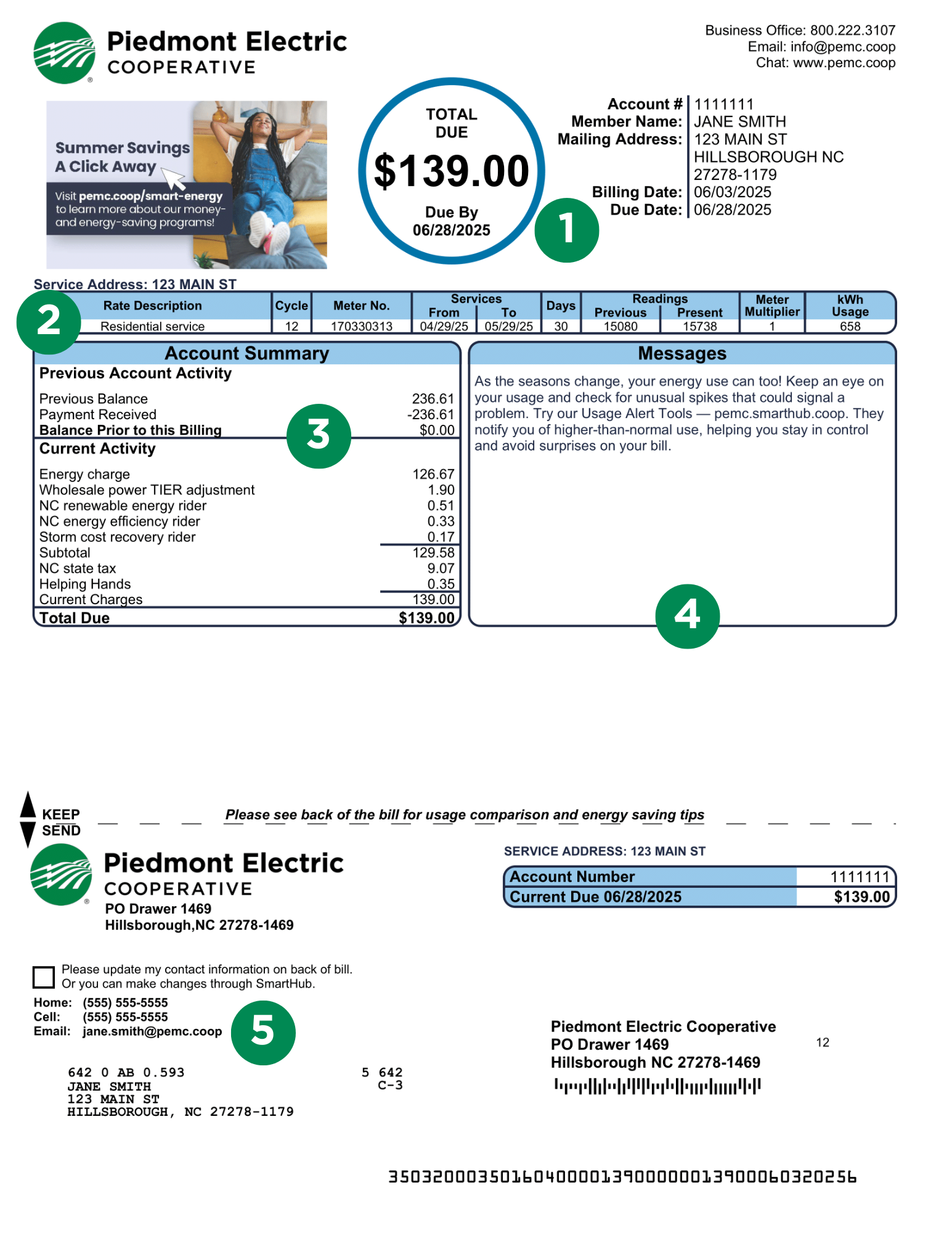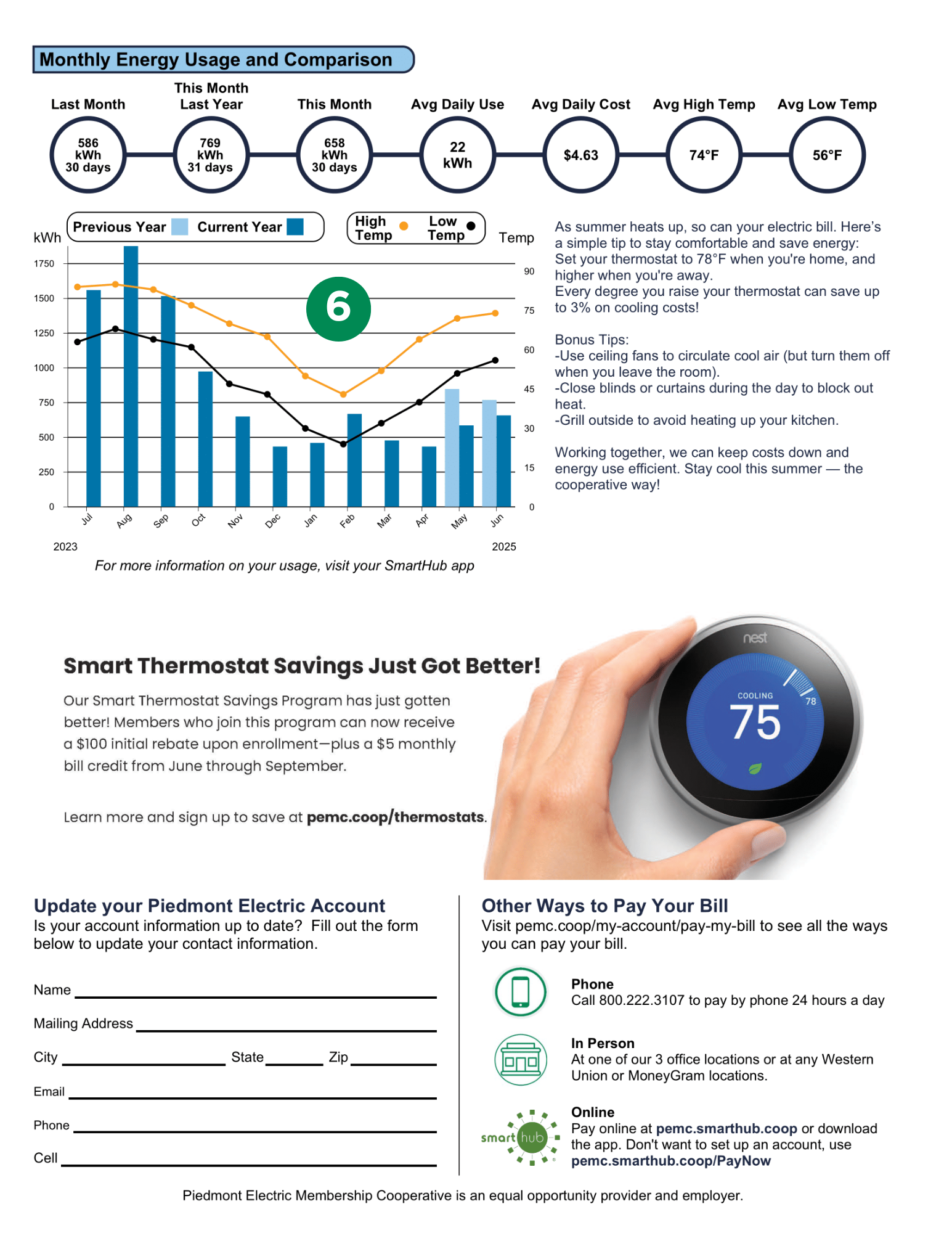Bill Breakdown
Your bill contains more information than you might think. Along with the total amount owed, your bill also tells you exactly how many kilowatt hours (kWhs) you used during a period and compares that total with the last month, the same month last year and the previous 24 months. You can use this information to detect abnormal energy use, which could indicate a faulty appliance or energy habit.
Note: A kilowatt hour (kWh) is a unit of measurement for electricity consumed. A kWh is equal to the amount of electricity ten 100-watt light bulbs would use in one hour. We set our rates based on kWhs, and the amount of kWhs you use is part of how we determine your final bill.
All of the important information at a glance. When your bill was printed, when it is due and a highlighted amount due.
Rate description – Describes the electric rate associated with your account.
Services – Dates from which you were billed this month.
Readings – These are the numbers that appear on your meter at the start and end of this month’s billing. The difference between these numbers will be the amount of energy you used this month.
Previous Account Activity
- Previous balance – amount due at the time of your previous billing.
- Payment received – summary of any payments you have made since your last bill. Remember, if you have made a payment after this bill’s billing date then it will not be shown on the bill until next month.
- Balance forward – your previous balance minus any payments received.
Details of Charges
- Energy charge – includes facility charge and kilowatt-hours of energy use.
- Wholesale power TIER adjustment – can be a credit or charge that fluctuates month to month depending on the cost of electricity and the co-op’s lenders’ financial requirements and is calculated based off kilowatt-hours of energy members use.
- NC renewable energy rider – charge to comply with North Carolina’s renewable energy standard.
- NC energy efficiency rider – charge incurred for energy efficiency programs.
- Storm cost recovery rider – recover costs that FEMA does not cover for costs associated with restoring power after big storms.
- Helping Hands – a program that members opt-in to round up their bill to the nearest dollar and is donated to the Helping Hand Foundation.
- NC State tax – required by the state to charge which is 7% of the bill charges.
- Current charges – amount due this month.
- Total amount due – your balance forward plus your current charges.
If you have specific questions about any additional line items on your bill, please reach out to our Member Services team at info@pemc.coop or 800.222.3107.
A quick note about cooperative news, important events or helpful programs.
Included here is the current contact information we have on file for you. If anything is out of date, please change it through SmartHub or notify us at info@pemc.coop or 800.222.3107 so that you can stay up-to-date on important information about your account, outage updates and cooperative news. You can also update this information on the back of the bill and mail it in.
Graph of the energy used in the past year. You can quickly compare the average temperature from this month to the previous month and the same month last year to see how changes in the weather affect your energy use and the amount you pay. We’ve also added in some seasonal energy efficiency tips to help you save.


Factors that Affect Your Bill
One of the biggest factors that impacts your bill is the one that’s hardest to control: weather. The more extreme the weather is outside, the more your home’s equipment has to work inside to keep your home comfortable. That’s why it’s more common for your bill to be higher in the summer and winter months.
Projects like adding insulation, caulking windows and cutting back on heating or cooling can help. Planning a big home improvement project? If so give us a call so we can let you know how the changes will impact your bill. Some big projects may require upgrades to your home’s electric service. Be sure to check out our rebates and loans to help with projects.
You may think that you use energy the way that you always have, and so, your bill should be the same as it’s always been. However, sometimes energy habits change slowly over time without you even realizing it.
If you are spending more time in your home than you used to or you’ve purchased a few new electronics or appliances, all of that adds up to more energy use. Even just spending five extra minutes in the shower each day can lead to a higher bill at the end of the month.
Fortunately, once you realize this, you can make small, energy-efficient changes that can help lower your bill.
See these energy saving tips for ideas on how to get started.
How old are the appliances in your home? The older they are, the more energy it likely costs to operate them. While it’s not always possible to replace your appliances with new, energy-efficient alternatives, you can try to be more mindful of how you use them.
For appliances that only need to be plugged in when you’re using them, like a coffee maker, try to remember to unplug them when you’re finished so you’re not paying for excess energy as appliances still use electricity even when they are turned off. To see how much it costs to operate the appliances in your home, try using the Dept. of Energy’s appliance calculator.
You might expect that two houses with the same square footage and the same number of people living in it will have a similar bill. While their energy-habits might be similar, it also depends on the houses themselves.
For example, if your home has good insulation, your bill will likely be less. Or, if you have an older home with old heating and cooling equipment and poor insulation, your energy bill could be higher than that of a bigger but more efficient home. To learn more about your home’s energy efficiency schedule a free home energy analysis.
Just like any other appliance in your home, your heating and cooling system becomes less efficient over time. If your unit is more than 10 years old, it might take more energy for the same thermostat setting you’ve used in the past. However, there are a few things you can do to help your system last longer. Changing your air filter monthly is a great place to start.
You can also call us at 800.222.3107 to contact one of our energy specialists for free advice about your system or learn more here.
Heated water is a sneaky culprit of higher bills. Every time you take a shower, wash your hands, run the dishwasher or run the washer on the hot cycle you’re paying to heat the water you use. By installing a timer on your water heater, you can heat water only when you need it.
Programs to Help You Save
One of the biggest factors that impacts your bill is the one that’s hardest to control: weather. The more extreme the weather is outside, the more your home’s equipment has to work inside to keep your home comfortable. That’s why it’s more common for your bill to be higher in the summer and winter months.
Projects like adding insulation, caulking windows and cutting back on heating or cooling can help. Planning a big home improvement project? If so give us a call so we can let you know how the changes will impact your bill. Some big projects may require upgrades to your home’s electric service. Be sure to check out our rebates and loans to help with projects.
How old are the appliances in your home? The older they are, the more energy it likely costs to operate them. While it’s not always possible to replace your appliances with new, energy-efficient alternatives, you can try to be more mindful of how you use them.
For appliances that only need to be plugged in when you’re using them, like a coffee maker, try to remember to unplug them when you’re finished so you’re not paying for excess energy as appliances still use electricity even when they are turned off. To see how much it costs to operate the appliances in your home use our appliance calculator.
You may think that you use energy the way that you always have, and so, your bill should be the same as it’s always been. However, sometimes energy habits change slowly over time without you even realizing it.
If you are spending more time in your home than you used to or you’ve purchased a few new electronics or appliances, all of that adds up to more energy use. Even just spending five extra minutes in the shower each day can lead to a higher bill at the end of the month.
Fortunately, once you realize this, you can make small, energy-efficient changes that can help lower your bill.
See these energy saving tips for ideas on how to get started.
